Global AI Voice Generator Market By Offering, By Application, By End Use Industry, By Region & Segmental Insights Trends and Forecast, 2024 – 2034
- Industry: Technology
- Report ID: TNR-110-1265
- Number of Pages: 420
- Table/Charts : Yes
- August, 2024
- Base Year : 2024
- No. of Companies : 10+
- No. of Countries : 29
- Views : 10062
- Covid Impact Covered: Yes
- War Impact Covered: Yes
- Formats : PDF, Excel, PPT
An AI voice generator is a technology that uses artificial intelligence to produce human-like speech from text or other audio inputs. Leveraging advanced algorithms, including deep learning and natural language processing (NLP), AI voice generators can mimic different vocal tones, accents, and styles, creating realistic and versatile voice outputs. These systems are used in various applications such as virtual assistants, content creation, customer service, and accessibility tools. AI voice generators have revolutionized the way we interact with machines, enabling more natural and intuitive communication across a wide range of industries.
According to recent statistics, the global AI voice generator market was valued at approximately USD 2.7 Bn in 2023 projected to reach USD 35.4 Bn by 2034; expected to grow at a CAGR of 26.5% from 2024 to 2034. The AI voice generator market is witnessing significant growth, propelled by advancements in deep learning and natural language processing, along with a rising demand for customized and interactive voice applications. These technologies are widely applied in various sectors, including virtual assistants, customer service, gaming, healthcare, and e-learning, where realistic voice synthesis improves user engagement and accessibility.
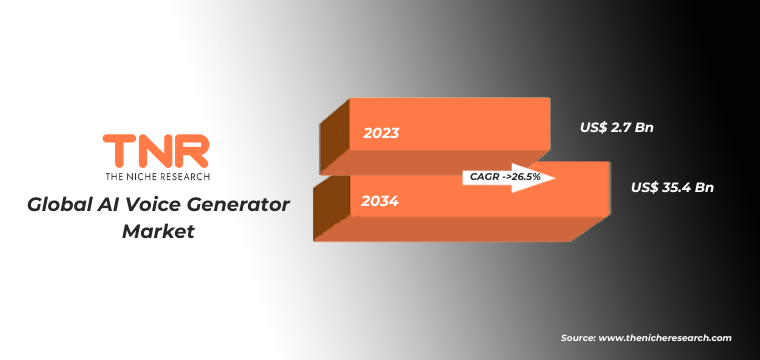
Global AI Voice Generator Market Dynamics
Global AI Voice Generator Market Growth Driver:
- Advancements in AI Technologies: The global AI voice generator market is propelled by continuous advancements in AI technologies, particularly in deep learning and natural language processing. These innovations enable more accurate and natural-sounding voice synthesis, driving demand across sectors like customer service, virtual assistants, and content creation.
- Increasing Demand for Personalized Voice Solutions: Rising consumer expectations for personalized and interactive experiences are fueling the AI voice generator market. Businesses are adopting AI-driven voice technologies to enhance user engagement and accessibility, particularly in industries such as gaming, healthcare, and e-learning, where customized voice outputs significantly improve the user experience.
Global AI Voice Generator Market Restraint:
- High Development and Implementation Costs: The global AI voice generator market faces challenges due to the high costs associated with developing and implementing advanced AI voice technologies. Small and medium-sized enterprises may find it difficult to invest in these solutions, limiting the market’s growth potential across various sectors.
- Ethical and Privacy Concerns: Ethical and privacy concerns related to AI-generated voices pose significant restraints to the market. The potential misuse of realistic voice synthesis for identity theft, deepfakes, or unauthorized recordings raises regulatory and consumer apprehensions, potentially hindering widespread adoption of AI voice generators in certain industries.
Global AI Voice Generator Market Opportunity:
- Expansion into Emerging Markets: The global AI voice generator market has significant growth potential in emerging markets, where increasing digitalization and investments in AI technologies are creating new opportunities. Expanding into regions like Asia-Pacific and Latin America can tap into a growing demand for innovative voice solutions across diverse industries.
- Integration with IoT and Smart Devices: The integration of AI voice generators with IoT and smart devices presents a major growth opportunity. As smart home technology, wearable devices, and connected systems become more prevalent, the demand for natural, interactive voice interfaces will rise, driving further adoption of AI voice technologies globally.
Global AI Voice Generator Market Trends:
- Increasing Adoption of Multilingual Voice Solutions: The global AI voice generator market is seeing a trend toward multilingual voice capabilities. As businesses expand globally, the need for AI voice generators that can accurately synthesize speech in multiple languages is growing, enhancing communication and customer engagement across diverse markets.
- Rise of Emotionally Adaptive Voice Technology: There is a growing trend toward emotionally adaptive AI voice technology, where voice generators can modify tone and expression based on context. This advancement enhances user experience by providing more natural and empathetic interactions, particularly in applications like virtual assistants, customer support, and healthcare.
Global AI Voice Generator Market Segmental Analysis:
Global AI Voice Generator Market By Offering
The software segment, as an offering category, has dominated the global AI voice generator market, driven by its crucial role in enabling advanced voice synthesis capabilities. This segment includes tools like text-to-speech (TTS), speech-to-speech (STS), and voice cloning software, which are essential for creating realistic and customizable voice outputs. The growing demand for personalized and interactive voice applications across industries such as customer service, gaming, and e-learning has further fueled the dominance of this segment. Additionally, the continuous advancements in AI algorithms and natural language processing have enhanced software performance, solidifying its leading position in the market.
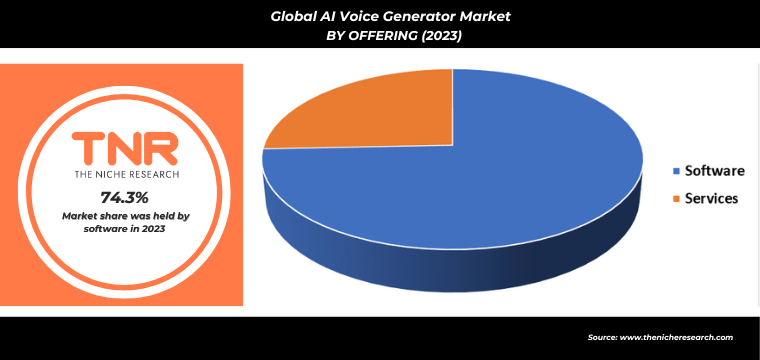
Global AI Voice Generator Market By Application
Voice cloning and conversion segment has emerged as the fastest-growing application in the global AI voice generator market. This segment is gaining rapid traction due to its ability to replicate human voices with high accuracy, enabling personalized and authentic voice interactions. Applications span across various industries, including entertainment, where voice cloning is used for dubbing and character voices, as well as in customer service for creating consistent brand voices. The demand for voice conversion technology is also rising in areas like accessibility, where it helps individuals with speech impairments communicate more effectively. As these applications expand, the Voice Cloning and Conversion segment is poised for significant growth.
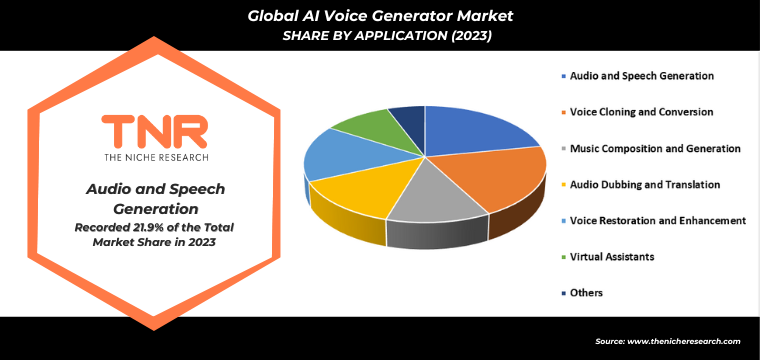
Global AI Voice Generator Market By End Use Industry
In 2023, the advertising and marketing segment led the global AI voice generator market, accounting for a 21.3% revenue share. This dominance is driven by the increasing use of AI-generated voices in creating personalized, engaging, and dynamic advertising content. Brands leverage AI voice technology to deliver consistent messaging across various platforms, enhance customer interactions, and improve targeting through tailored voice campaigns. The ability to create unique brand voices that resonate with diverse audiences has made AI voice generators an essential tool in modern marketing strategies, contributing to the significant revenue share of this segment.
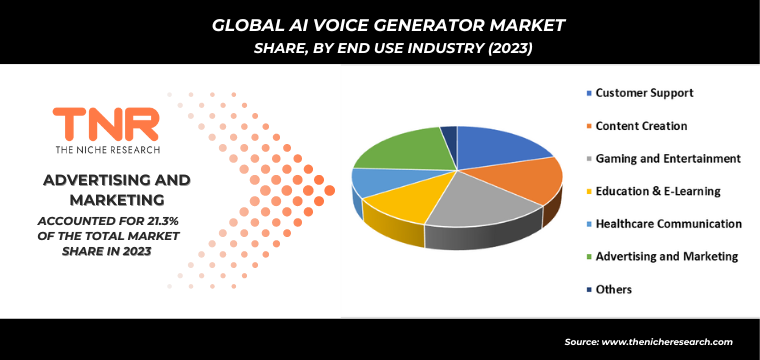
Global AI Voice Generator Market By Region
North America held regional dominance in the global AI voice generator market, largely due to its advanced technological infrastructure and robust investment in artificial intelligence research and development. The presence of leading tech companies and AI innovators in the region has accelerated the adoption of AI voice technologies across various industries, including entertainment, healthcare, and customer service. Additionally, the region’s strong demand for personalized and interactive voice applications, coupled with favorable regulatory environments and high consumer awareness, has further fueled market growth. The widespread use of AI voice generators in virtual assistants, smart devices, and digital marketing strategies has solidified North America’s leading position in the global market.
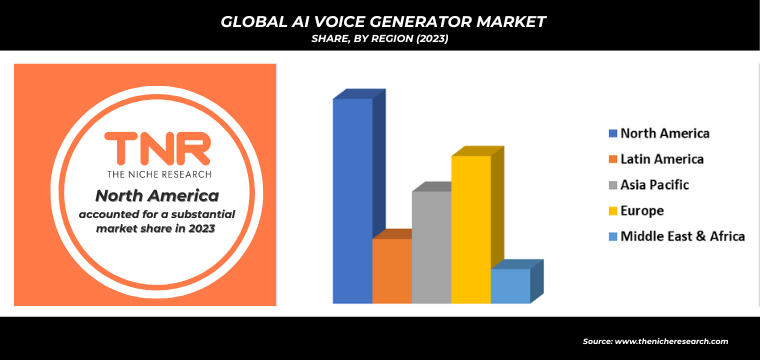
Competitive Landscape
The competitive landscape of the global AI voice generator market is marked by key players like Microsoft, IBM, and Amazon, who drive innovation with advanced technologies. Companies compete on performance, customization, and integration capabilities to capture market share.
Some of the players operating in the AI voice generator market are
- Amazon Web Services, Inc.
- Cisco Systems, Inc.
- ElevenLabs
- Google LLC
- IBM
- Inworld AI
- Microsoft
- OpenAI
- Resemble AI
- SoundHound AI Inc.
- Other Industry Participants
Key Developments:
- In May 2024, Microsoft teamed up with Truecaller to integrate Microsoft Azure AI Speech’s new Personal Voice technology. This collaboration allows Truecaller Assistant users to create a full digital replica of their own voice for use within the Assistant.
- Also in May 2024, Inworld AI introduced Inworld Voice, an AI voice generator providing 58 distinct voices for gaming and other uses. This product features advanced machine-learning models for superior voice quality and customization. The initial 100 requests per day are offered for free, and integration is included for customers using the Inworld Engine.
Global AI Voice Generator Market Scope:
| Report Specifications | Details |
| Market Revenue in 2023 | US$ 2.7 Bn |
| Market Size Forecast by 2034 | US$ 35.4 Bn |
| Growth Rate (CAGR) | 26.5% |
| Historic Data | 2016 – 2022 |
| Base Year for Estimation | 2023 |
| Forecast Period | 2024 – 2034 |
| Report Inclusions | Market Size & Estimates, Market Dynamics, Competitive Scenario, Trends, Growth Factors, Market Determinants, Key Investment Segmentation, Product/Service/Solutions Benchmarking |
| Segments Covered | By Offering, By Application, By End Use Industry, By Region |
| Regions Covered | North America, Europe, Asia Pacific, Middle East & Africa, Latin America |
| Countries Covered | U.S., Canada, Mexico, Rest of North America, France, The UK, Spain, Germany, Italy, Nordic Countries (Denmark, Finland, Iceland, Sweden, Norway), Benelux Union (Belgium, The Netherlands, Luxembourg), Rest of Europe, China, Japan, India, New Zealand, Australia, South Korea, Southeast Asia (Indonesia, Thailand, Malaysia, Singapore, Rest of Southeast Asia), Rest of Asia Pacific, Saudi Arabia, UAE, Egypt, Kuwait, South Africa, Rest of Middle East & Africa, Brazil, Argentina, Rest of Latin America |
| Key Players | Amazon Web Services, Inc., Cisco Systems, Inc., ElevenLabs, Google LLC, IBM, Inworld AI, Microsoft, OpenAI, Resemble AI, SoundHound AI Inc. |
| Customization Scope | Customization allows for the inclusion/modification of content pertaining to geographical regions, countries, and specific market segments. |
| Pricing & Procurement Options | Explore purchase options tailored to your specific research requirements |
| Contact Details | Consult With Our Expert
Japan (Toll-Free): +81 663-386-8111 South Korea (Toll-Free): +82-808- 703-126 Saudi Arabia (Toll-Free): +966 800-850-1643 United Kingdom: +44 753-710-5080 United States: +1 302-232-5106 E-mail: askanexpert@thenicheresearch.com
|
Global AI Voice Generator Market Segmentation:
By Offering
- Software
- Services
- Professional Services
- Managed Services
By Application
- Audio and Speech Generation
- Voice Cloning and Conversion
- Music Composition and Generation
- Audio Dubbing and Translation
- Voice Restoration and Enhancement
- Virtual Assistants
- Others
By End Use Industry
- Customer Support
- Content Creation
- Gaming and Entertainment
- Education & E-Learning
- Healthcare Communication
- Advertising and Marketing
- Others
By Region
- North America (U.S., Canada, Mexico, Rest of North America)
- Europe (France, The UK, Spain, Germany, Italy, Nordic Countries (Denmark, Finland, Iceland, Sweden, Norway), Benelux Union (Belgium, The Netherlands, Luxembourg), Rest of Europe)
- Asia Pacific (China, Japan, India, New Zealand, Australia, South Korea, Southeast Asia (Indonesia, Thailand, Malaysia, Singapore, Rest of Southeast Asia), Rest of Asia Pacific)
- Middle East & Africa (Saudi Arabia, UAE, Egypt, Kuwait, South Africa, Rest of Middle East & Africa)
- Latin America (Brazil, Argentina, Rest of Latin America)
Report Layout:
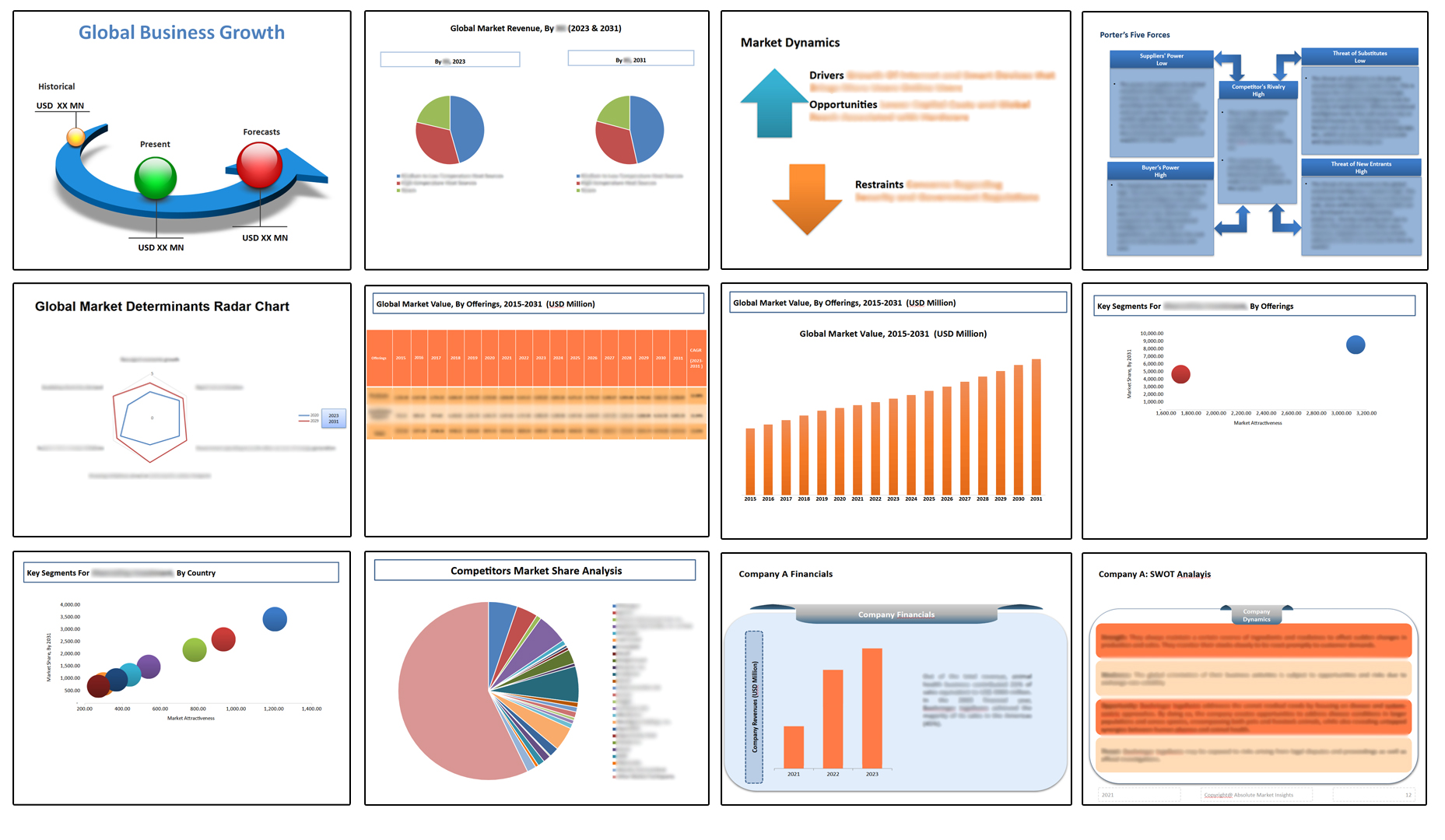
Table of Contents
Note: This ToC is tentative and can be changed according to the research study conducted during the course of report completion.
**Exclusive for Multi-User and Enterprise User.
Global AI Voice Generator Market Segmentation:
By Offering
- Software
- Services
- Professional Services
- Managed Services
By Application
- Audio and Speech Generation
- Voice Cloning and Conversion
- Music Composition and Generation
- Audio Dubbing and Translation
- Voice Restoration and Enhancement
- Virtual Assistants
- Others
By End Use Industry
- Customer Support
- Content Creation
- Gaming and Entertainment
- Education & E-Learning
- Healthcare Communication
- Advertising and Marketing
- Others
By Region
- North America (U.S., Canada, Mexico, Rest of North America)
- Europe (France, The UK, Spain, Germany, Italy, Nordic Countries (Denmark, Finland, Iceland, Sweden, Norway), Benelux Union (Belgium, The Netherlands, Luxembourg), Rest of Europe)
- Asia Pacific (China, Japan, India, New Zealand, Australia, South Korea, Southeast Asia (Indonesia, Thailand, Malaysia, Singapore, Rest of Southeast Asia), Rest of Asia Pacific)
- Middle East & Africa (Saudi Arabia, UAE, Egypt, Kuwait, South Africa, Rest of Middle East & Africa)
- Latin America (Brazil, Argentina, Rest of Latin America)
The Niche Research approach encompasses both primary and secondary research methods to provide comprehensive insights. While primary research is the cornerstone of our studies, we also incorporate secondary research sources such as company annual reports, premium industry databases, press releases, industry journals, and white papers.
Within our primary research, we actively engage with various industry stakeholders, conducting paid interviews and surveys. Our meticulous analysis extends to every market participant in major countries, allowing us to thoroughly examine their portfolios, calculate market shares, and segment revenues.
Our data collection primarily focuses on individual countries within our research scope, enabling us to estimate regional market sizes. Typically, we employ a bottom-up approach, meticulously tracking trends in different countries. We analyze growth drivers, constraints, technological innovations, and opportunities for each country, ultimately arriving at regional figures.Our process begins by examining the growth prospects of each country. Building upon these insights, we project growth and trends for the entire region. Finally, we utilize our proprietary model to refine estimations and forecasts.
Our data validation standards are integral to ensuring the reliability and accuracy of our research findings. Here’s a breakdown of our data validation processes and the stakeholders we engage with during our primary research:
- Supply Side Analysis: We initiate a supply side analysis by directly contacting market participants, through telephonic interviews and questionnaires containing both open-ended and close-ended questions. We gather information on their portfolios, segment revenues, developments, and growth strategies.
- Demand Side Analysis: To gain insights into adoption trends and consumer preferences, we reach out to target customers and users (non-vendors). This information forms a vital part of the qualitative analysis section of our reports, covering market dynamics, adoption trends, consumer behavior, spending patterns, and other related aspects.
- Consultant Insights: We tap into the expertise of our partner consultants from around the world to obtain their unique viewpoints and perspectives. Their insights contribute to a well-rounded understanding of the markets under investigation.
- In-House Validation: To ensure data accuracy and reliability, we conduct cross-validation of data points and information through our in-house team of consultants and utilize advanced data modeling tools for thorough verification.
The forecasts we provide are based on a comprehensive assessment of various factors, including:
- Market Trends and Past Performance (Last Five Years): We accurately analyze market trends and performance data from preceding five years to identify historical patterns and understand the market’s evolution.
- Historical Performance and Growth of Market Participants: We assess the historical performance and growth trajectories of key market participants. This analysis provides insights into the competitive landscape and individual company strategies.
- Market Determinants Impact Analysis (Next Eight Years): We conduct a rigorous analysis of the factors that are projected to influence the market over the next eight years. This includes assessing both internal and external determinants that can shape market dynamics.
- Drivers and Challenges for the Forecast Period:Identify the factors expected to drive market growth during the forecast period, as well as the challenges that the industry may face. This analysis aids in deriving an accurate growth rate projection.
- New Acquisitions, Collaborations, or Partnerships: We keep a close watch on any new acquisitions, collaborations, or partnerships within the industry. These developments can have a significant impact on market dynamics and competitiveness.
- Macro and Micro Factors Analysis:A thorough examination of both macro-level factors (e.g., economic trends, regulatory changes) and micro-level factors (e.g., technological advancements, consumer preferences) that may influence the market during the forecast period.
- End-User Sentiment Analysis: To understand the market from the end-user perspective, we conduct sentiment analysis. This involves assessing the sentiment, preferences, and feedback of the end-users, which can provide valuable insights into market trends.
- Perspective of Primary Participants: Insights gathered directly from primary research participants play a crucial role in shaping our forecasts. Their perspectives and experiences provide valuable qualitative data.
- Year-on-Year Growth Trend: We utilize a year-on-year growth trend based on historical market growth and expected future trends. This helps in formulating our growth projections, aligning them with the market’s historical performance.
Research process adopted by TNR involves multiple stages, including data collection, validation, quality checks, and presentation. It’s crucial that the data and information we provide add value to your existing market understanding and expertise. We have also established partnerships with business consulting, research, and survey organizations across regions and globally to collaborate on regional analysis and data validation, ensuring the highest level of accuracy and reliability in our reports.









